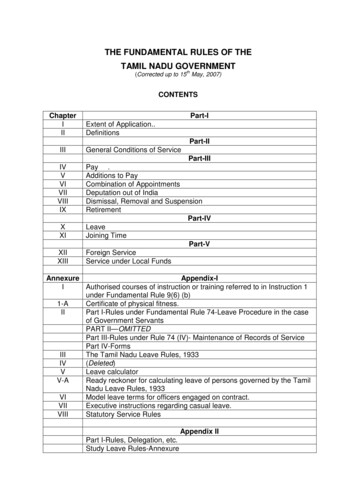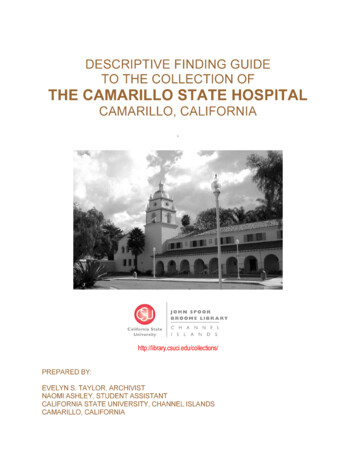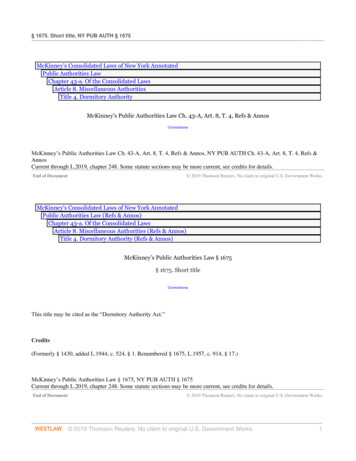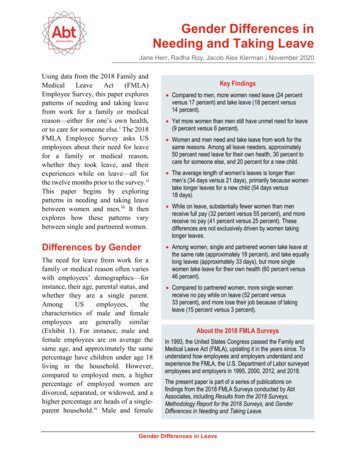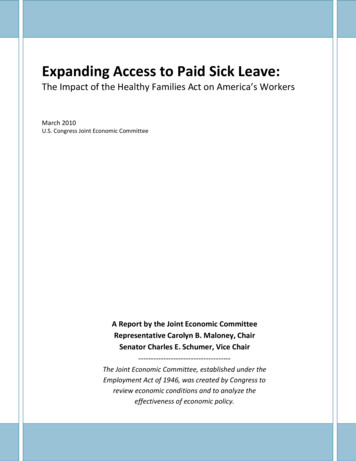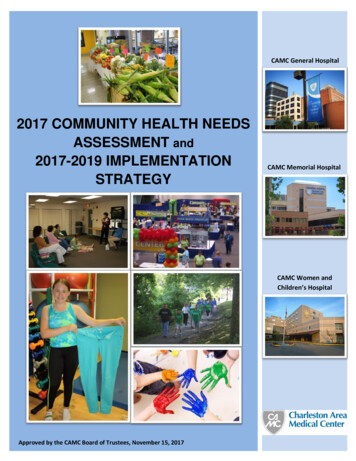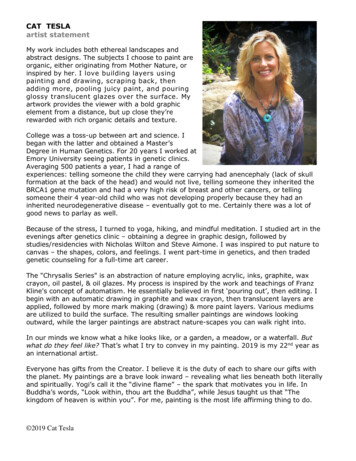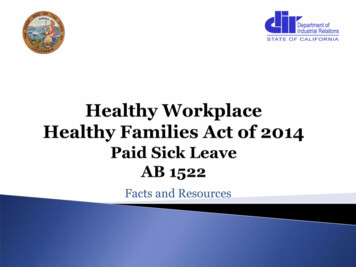
Transcription
After You Leavethe HospitalResuming Activities after your Heart SurgeryWhat aremy activityrestrictions? Do not lift any objects over 10 pounds after surgery. As areference, a gallon of milk weighs about 8 pounds. Do not push or pull heavy objects such as a vacuum cleaner,lawn mower or furniture. Do not drive until cleared by your physician.Driving Your Doctor will decide when you can drive again. You will begiven specific instructions at your follow up clinic visit. You can ride as a passenger in a car at any time. Short trips are best at first (wear your seatbelt). You may cushion your incision with a towel or small blanket ifnecessary.What activitiesshould I do?Activities Use your breathing machine four times a day (ten breaths eachtime) until you return for your clinic visit. Walk every day (find an indoor setting during bad weather). You may climb stairs - limit the number of times until you arefeeling well. Wear your support stockings (TEDS) during the day. You mayremove them at night. You may stop wearing those four to sixweeks after your operation. Elevate your feet as high as possible when sitting (toes higherthan nose). Continue with the mobility exercises given to you anddemonstrated by physical therapy in the hospital.After You Leave the Hospital 99
What stepsshould I taketo monitor myhealth at home? Take your temperature each morning before eating or drinkingand at any time you think you may have a fever. Keep a recordof your daily temperature. Weigh yourself at the same time each morning, after you urinatebut before you eat breakfast. Use the same scale every day. Keepa record of your daily weight. Check your blood pressure and heart rate in the morning afteryou have taken your morning medications. Monitor your incisions daily for signs of infection (increasingredness, tenderness, swelling, warmth or drainage).Monitor your health byusing the Care Pathwaydocument that is includedwith this booklet.Your Care Pathway at Home: Week 1Examples:Date:We Recommend that you:Take your temperature(temp)Take your temperature before eating everymorning.Weigh yourselfWeigh yourself every morning before eating andafter going to the bathroom.Take Pulse/Blood Pressure Take your pulse and blood pressure daily, or ask(BP)the visiting nurse to write it down for you.ExercisesSee the “Exercises” chapter in your bookletIncision CareShower daily with soap and water. Do notuse any creams, lotions or powders on yourincisions. NO Tub Baths.Elevate your legsJune 15Temp: 98.6Weight:165120/70PULSE: 72 BP:Day 2/Day 3/Day 4/Day 5/Day 6/Day 7//Temp:Temp:Temp:Temp:Temp:Temp:A temperature above 100.5 Weight gain of 5 poundsor more in 3 daysBP:BP:BP:BP:BP:BP:BP:Palpitations or an irregular heart ease time you walk every day. Don’t worryabout distance. Walking to the bathroomdoes not count! Walking up and down stairs isencouraged.Weight loss of 7 poundsor more before your clinicvisitShortness of breath worse than in the hospitalBleeding, redness,swelling, increased painor drainage near yourincisionIncision that opensup after you leave thehospitalIncreased swelling in your legs or ankles Wear daily. Remove at night.WalkIncrease the time you walkeverydayCall your doctor if you have.Temp: Elevate your legs while sitting.Wear Support HoseNausea, vomiting or diarrheaUse Incentive Spirometer 4 See the page on Incentive Spirometer in yourtimes each daybooklet. Use incentive spirometer during :Time:10 :2:2:3:3:3:3:3:3:3:4:4:4:4:4:4:4:Time: 9Time:Time: 121:2:3:4:minutes Take Pain medicationTake pain medication as directed by yoursurgeon for the first few days. Begin toreduce your pain meds after 4 or 5 daysas tolerated. (Decrease the number of pills orincrease the time between pills.)Avoid ConstipationTake stool softener while taking painmedications. Increase activity. Eat more fruitsand vegetables. Take your medicationTake medication as directed by your surgeon Who do you call?Day 1Restrictions:No lifting greater than10 pounds.Do not push or pullheavy objects. Do not drive.UM Cardiovascular Center Call Center: 888-287-1082 (8a-5pm M-F)After Hours Paging Number: 734-936-6267 and ask for the Cardiac Surgery Resident on CallEveryone recoversfrom an operationat a different pace.100 Heart Surgery: A Guide for Patients and Their Families Michigan Medicine03/21/2017
What do I do if I have concerns?Call 9-1-1 immediately if you develop:When do Ineed to seekemergency care? Sudden onset of chest painShortness of breath not relieved by restIf your legs feel numb, tingly, cold or look blueYou believe you are experiencing a true emergencyCommon Signs of Stroke: Sudden confusion or trouble speaking or understanding others Sudden trouble seeing in one or both eyes Sudden numbness or weakness of the face, arm, or leg, usuallyon one side of your body Sudden trouble walking, dizziness, or loss of balance orcoordination Sudden or severe headache with no known causeWhen do I need to seek medical attention?Call CardiacSurgery if youdevelop any ofthe followingsigns andsymptoms: Under the tongue temperature above 100.5 F Bleeding, redness, swelling, increased pain or foul smellingdrainage near your incision site Incisions that open up after you leave the hospital Increased swelling in your legs or ankles Weight gain of more than 5 pounds in 3 days or weight loss of 7pounds or more before your follow up clinic visit Increased shortness of breath/difficulty breathing Trouble urinating Nausea, vomiting or diarrhea Stomach pain or bloating Chills or excessive sweating A vague feeling that something is wrongWhat is the number to call?Monday through Friday from 8am to 5pm: Call 888-287-1082Ask to speak to the Cardiac Surgery Nurse if you have any of the signs orsymptoms above.After 5pm or on weekends or holidays: Call 734-936-6267Ask to speak with the Cardiac Surgery resident on call.After You Leave the Hospital 101
How do I care for my incisions? Shower or sponge bathe every day. Do not soak in a bathtub orget into a swimming pool for the next 4 weeks. Allow the water to hit your back and roll over your shoulders. Wash your incision with your usual bath soap and water. Pat dryand leave open to air. Use a clean towel each time you shower. Do not put any creams, lotions, powders or ointments on yourincision until your incision is completely healed.Useful information after your surgeryReturning to work and everyday activitiesAt your first clinic appointment following your discharge from thehospital, your surgeon will be able to approximate a date for your returnto work. Everyone recovers from an operation at a different pace. Yourfirst priority is to take care of yourself and recover completely.Household choresYou are encouraged to do light household activities in the four weeksfollowing surgery. These activities include dusting, meal preparation,washing clothes with an automatic washer and dryer (avoid lifting a heavylaundry basket) and washing dishes. Pace yourself and gradually increasethe amount of activity as your energy builds.Sexual activityIt is normal for both partners to be worried about resuming sexual activity after heart surgery. Most people worry about sexual intercourse because they are afraid it may cause discomfort and/or strain on the heart.The exertion needed to perform sexual intercourse is similar to climbingstairs or walking around the block at a brisk pace. If these activities arenot difficult for you, you may resume sexual activities whenever you feelready. Your best indicator is how you feel-both physically and mentally.Some medications may interfere with sexual functioning. If you have anyproblems, discuss them with your surgeon or nurse.102 Heart Surgery: A Guide for Patients and Their Families Michigan Medicine
Some general guidelines to help you resume sexual relations include: For the first eight weeks, avoid positions that cause pressure onyour breastbone or tension in your arms and chest. Pick a time when you are content, relaxed, and happy. Wait two hours after eating a full meal or drinking alcohol. Remember that it is normal for your breathing and heart rateto increase during sex and that these should return to normalshortly afterward. If you experience shortness of breath, chestpain and/or palpitations, stop, and rest. Let your doctor know if you experience any abnormalsymptoms.Precautions for heart valve surgery patientsIf you have an artificial (prosthetic) heart valve replacement, repair orprosthetic graft material, you must be protected from infection for therest of your life. You need to take an antibiotic prior to any medical ordental procedure. This includes dental work, all operations, obstetrical/gynecological and urological procedures. Do not have any dental work forat least 6 months after surgery unless it is an emergency.You should contact your physician one week before any medical or dentalprocedures to obtain the appropriate antibiotic prescription. If you haveany known allergies to medications, inform your physician when you call.Report any signs or symptoms of infection to your physician immediately.Do not wait for these symptoms to disappear. You can have an infectioneven if you are taking an antibiotic.The signs and symptoms of infection include: temperature is 100.5 For greater, chills, night sweats, joint aches, redness, warmth or drainagecontaining pus from a wound. If an infection is present, your doctor willlikely prescribe antibiotics and/or hospitalization.After You Leave the Hospital 103
What can I expect when I get home? DifficultySleepingDifficulty sleepingLack of appetitePost-operative constipationFeelings of depression or mood changesMany people complain of having trouble sleeping for some time afterheart surgery. You may experience insomnia (an inability to sleep) because of: The effects of anesthesiaDiscomfort related to healingChanges in your daily routineStress from personal concernsYou should return to normal sleeping patterns within 2-3 weeks.Try these tips to help you sleep: Make sure you take enough rest breaks in between your normaldaily activities, but avoid a nap longer than 15 to 20 minutesduring the day. If you have pain, take your pain medication about 30 minutesbefore bedtime. Arrange the pillows so you can maintain a comfortable positionand decrease muscle strain. If you feel anxious or nervous, talk to your spouse, partner, or atrusted friend. Get your troubles off your mind. Avoid caffeine in the evenings (such as chocolate, coffee, tea,and colas). Listen to relaxing music or a guided imagery audio program. Ask your partner to give you a back rub. Take a relaxing shower. Follow a bedtime routine. Follow the same rituals to let yourbody know it is time to relax and get to sleep. It is okay to sleep on your back, side, or stomach. You will nothurt your incisions.104 Heart Surgery: A Guide for Patients and Their Families Michigan Medicine
You should return tonormal sleeping patternswithin 2-3 weeks.Night Sweats: Patients often complain of night sweats for the first few weeks. Should you experience this, check your temperature to makesure you do not have a fever. If your temperature is 100.5 F orgreater, call your doctor.Disturbed Sleep Following surgery, some patients experience disturbing dreamsor insomnia. This will also disappear with time. To help you sleep better, try shortening your naps during the dayand/or increasing your afternoon activities so that you will feeltired in the evenings. It is OK to sleep on your back, side or stomach. You will not hurtyour incisions.Call your doctor if: You are feeling sad, hopeless, fatigued, irritable or lonely mostdays following your surgery. These could be signs of depression. A lack of sleep is causing problems for you such as an inability toparticipate in your recovery or an inability to stay awake duringthe day. Normal sleep patterns have not returned within 2-3 weeks aftersurgery.After You Leave the Hospital 105
Lack of appetiteYou may notice after surgery you have lost yourappetite for food or just feel too tired to eat. Thisis very common so be patient. Your appetite will soonbe back to normal.Proper NutritionWe suggest you try eating frequent, small mealsthroughout the day. You do need proper nutrition toenable your body to heal and get stronger. You shouldfollow a diet low in fat, cholesterol and sodium thatincludes protein-rich foods.Good sources of protein include fish, eggs, dairy,beans, and nuts. Please limit the total amount of salt inyour diet to 2,000 mg a day. Foods known to be highin salt include restaurant food, soups, pizza, bacon,and other processed meats.Post-operativeconstipationConstipation is a common side affect after your operation. Several factors may contribute to constipationafter surgery. These include: decreased activity, painmedication, or changes to your diet. Increasing youractivity and eating more fresh fruit, vegetable and highfiber foods may help you. You should continue to takea stool softener such as Colace while taking pain medication. A fiber laxative such as Psyllium (Metamucil )may also be helpful. Start walking around as soon asyou can and increase the distance.106 Heart Surgery: A Guide for Patients and Their Families Michigan Medicine
The Emotional Aspects of RecoveryFeelings ofdepression ormood changesRecovering from open heart surgery also involves your emotional healing. The recovery process uses emotional and physical energy. Ifyou feel upset or emotional in the days and weeks after your operation,don’t worry - this is a perfectly normal reaction which many patientsexperience. Many patients report these feelings up to three months aftertheir operation.It is common for people who have had surgery to: Experience mood swingsFeel depressed or gloomyCry easily for no apparent reasonFeel afraid, nervous or anxiousFeel helplessFeel lonelyLack energy or motivationGet easily frustratedBe irritable or angryNot be unable to concentrateHave good days and bad daysFeel more emotional or sentimental than normalIf you have thoughts of hurtingyourself or someone else, besure to call the CVC SocialWorker at (734) 232-1559.After You Leave the Hospital 107
How do I handle my emotions after I get home?Once you are home, even though you may feel drained physically andemotionally, it is important you follow guidelines for good self-care.Here are some things you can do to help yourself recover: Get dressed every day. Walk daily within your limits. Get plenty of rest. Resume hobbies and social activities you enjoy. Visit with others. Ensure you have a support system in place that can help withyour physical and emotional needs. Discussing your fears,frustrations, pain, concerns and successes with someone is animportant part of the healing process. Join a support group.As you resume yournormal activities, youwill notice gradualimprovement in yourmood and outlook.108 Heart Surgery: A Guide for Patients and Their Families Michigan Medicine
How do I knowwhen to seekhelp?If you find yourself still feeling unmotivated, unusually fatigued,weepy, angry, hopeless, or sad after 3 weeks, or if you have thoughtsof hurting yourself or someone else, be sure to call the CVC SocialWorker at 734-232-1559 or your Primary Care Doctor and make anappointment to talk about how you are feeling.Your family andfriends need tobalance their ownfeelings while tryingto support yourrecovery.Emotional Impact Heart surgery is stressful for all people involved, not just the patient. Theyon Family andhave the extra responsibilities of the caring role, as well as juggling theFriendshome and work life. Sometimes, patient needs are greater than anticipated and can lead to stress.Your family and friends need to balance their own feelings while trying tosupport your recovery. It is important for your family and friends to takecare of themselves physically and emotionally.Strategies forFamily andFriendsIf you’re a family member or friend, here are some tips: Don’t neglect your own needs. Eat well, stay active and getplenty of rest. Be patient– it is not unusual for your loved one to have good andbad days. Share your feelings with a close friend. Ask for help if you feel overwhelmed. Be specific about yourneeds such as meals, chores, pet-sitting, time alone, etc. Talk to your family doctor if you have feelings that areconcerning. Do something you enjoy and find relaxing.After You Leave the Hospital 109
Notes110 Heart Surgery: A Guide for Patients and Their Families Michigan Medicine
After You Leave the Hospital 99 After You Leave the Hospital Resuming Activities after your Heart Surgery What are my activity restrictions? Do not lift any objects over 10 pounds after surgery. As a reference, a gallon of milk weighs about 8 pounds. Do not push or pull heavy o


